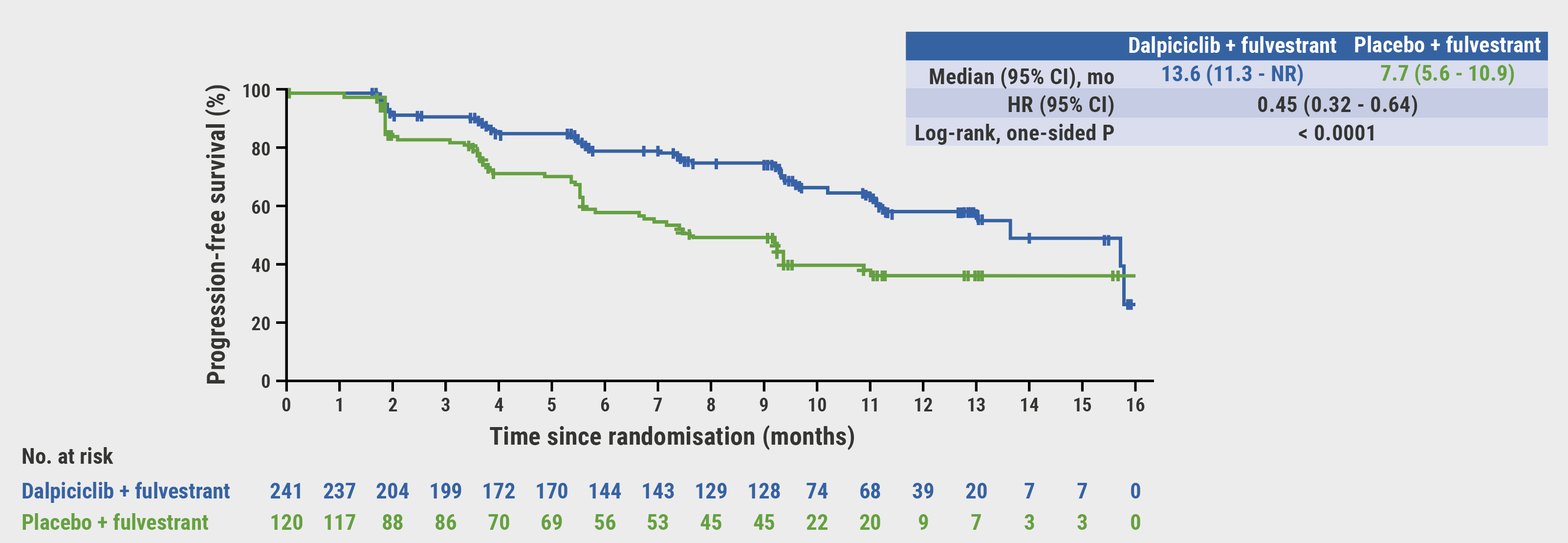For patients with HR-positive, HER2-negative advanced breast cancer, treatment with a CDK4/6 inhibitor combined with endocrine therapy is the standard of care, since it achieves a substantial progression-free benefit, significantly increases overall survival, and either maintains or improves quality of life [1]. Dalpiciclib is a novel CDK4/6 inhibitor that has demonstrated tolerability and preliminary anti-tumour activity in pre-treated HR-positive, HER2-negative advanced breast cancer [2].
DAWNA-1 (NCT03927456) is a randomised, phase 3 clinical trial evaluating the efficacy and safety of dalpiciclib in HR-positive, HER2-negative advanced breast cancer patients who relapsed or progressed on previous endocrine therapy. The trial enrolled 361 patients who were randomised 2:1 to receive dalpiciclib (150 mg once daily, first 3 weeks of every 4 weeks) plus fulvestrant (500 mg, day 1 and 15 of cycle 1, then day 1 every 4 weeks) or placebo plus fulvestrant. The primary endpoint was progression-free survival. Prof. Binghe Xu (Chinese Academy of Medical Sciences and Peking Union Medical College, China) presented the first results of DAWNA-1 [3].
With a median follow-up of 10.5 months, dalpiciclib plus fulvestrant significantly improved median progression-free survival (per independent review committee): 13.6 months versus 7.7 months (HR 0.45; 95% CI 0.32–0.64; P<0.0001; see Figure). Median time to first subsequent chemotherapy was not reached for dalpiciclib versus 14.2 months for placebo.
Figure: Progression-free survival in DAWNA-1 [3]

Grade 3 or 4 toxicity was increased in patients treated with dalpiciclib compared with placebo: 88.3% versus 11.7%. The most common grade 3 or 4 adverse events with dalpiciclib were neutropenia and leukopenia. Treatment discontinuation due to adverse events was reported for 2.5% of patients treated with dalpiciclib versus 3.3% in the placebo arm.
- Cardoso F, et al. Ann Oncol. 2020;31:1623-1649.
- Zhang P, et al. Biomark Res. 2021;9:24.
- Xu B, et al. Dalpiciclib versus placebo plus fulvestrant in HR+/HER2- advanced breast cancer that relapsed or progressed on previous endocrine therapy (DAWNA-1): A multicenter, randomized, phase 3 study. Abstract 1002, ASCO 2021 Virtual Meeting, 4–8 June.
Copyright ©2021 Medicom Medical Publishers
Posted on
Previous Article
« New GI symptoms common among IBD patients with COVID-19 Next Article
Trastuzumab-deruxtecan showed promising activity in patients with HER2-expressing mCRC »
« New GI symptoms common among IBD patients with COVID-19 Next Article
Trastuzumab-deruxtecan showed promising activity in patients with HER2-expressing mCRC »
Table of Contents: ASCO 2021
Featured articles
Downloadable 1-Page Editor-Selected Trial PowerPoint Slides
Breast Cancer
Excellent prognosis for breast cancer patients with ultra-low-risk gene signature
Olaparib benefits early breast cancer patients with BRCA1/2 germline mutation
Platinum-based adjuvant chemotherapy in TNBC is not superior or non-inferior to capecitabine
Dalpiciclib benefits patients with HR-positive, HER2-negative advanced breast cancer
Trastuzumab-deruxtecan showed clinical activity in patients with brain metastases
Lung Cancer
Neoadjuvant nivolumab plus chemotherapy improves surgical outcomes in NSCLC
Immune-related adverse events are associated with efficacy of atezolizumab in patients with advanced NSCLC
Sustained efficacy of nivolumab/ipilimumab plus 2 cycles of chemotherapy in NSCLC
Patritumab deruxtecan (HER3-DXd) in EGFR TKI-resistant NSCLC
Melanoma
Long-term results from ground-breaking melanoma trials
Novel dual checkpoint blockade improves progression-free survival in melanoma
Neoadjuvant therapy with nivolumab plus relatlimab is safe and effective in patients with stage III melanoma
Genitourinary Cancers
VISION trial shows improved survival with 177Lu-PSMA-617 in mCRPC
Abiraterone added to ADT + docetaxel nearly doubles survival in de novo mCSPC
Post-nephrectomy pembrolizumab improves disease-free survival
Glutaminase inhibitor telaglenastat does not improve survival mRCC
Promising efficacy and safety of feladilimab in recurrent/metastatic urothelial carcinoma
Gastrointestinal Cancers
Pembrolizumab benefits survival in MSI-H/dMMR metastastic colorectal cancer
Panitumumab added to 5-FU/LV effective as maintenance therapy in patients with mCRC
Trastuzumab-deruxtecan showed promising activity in patients with HER2-expressing mCRC
Benefit of both I-O/chemo combo and I-O/I-O combo over chemotherapy alone in oesophageal squamous cell cancer
Benefit of I-O/chemo combo over chemotherapy alone in advanced GC/GEJC/EAC
Perioperative chemotherapy and neoadjuvant multimodality therapy appear equally effective
Haematological Cancers
Olutasidenib demonstrates efficacy in patients with relapsed/refractory IDH1 mutant AML
Acalabrutinib as effective but better tolerated than ibrutinib in CLL
Gynaecological Cancers
Adjuvant chemotherapy does not improve outcome in patients with locally advanced cervical cancer
Novel drug combination for recurrent ovarian cancer
Dual HER2-blockade shows anti-tumour activity in patients with uterine cancer
Paediatric Cancer
Molecular tumour profiling impacts the diagnosis and treatment of solid tumours
Circulating tumour DNA to evaluate response in children with neuroblastoma
Basic Science
PARP7 inhibitor shows promising results in first-in-human trial
IACS-6274 is well tolerated and biologically active in selected advanced tumours
CYT-0851 shows promising anti-tumour activity across different tumour types
Related Articles

August 10, 2021
Letter from the Editor
© 2024 Medicom Medical Publishers. All rights reserved. Terms and Conditions | Privacy Policy
HEAD OFFICE
Laarderhoogtweg 25
1101 EB Amsterdam
The Netherlands
T: +31 85 4012 560
E: publishers@medicom-publishers.com

